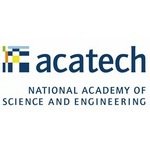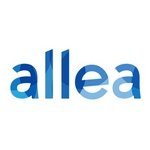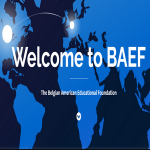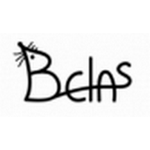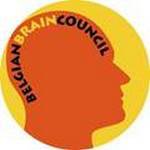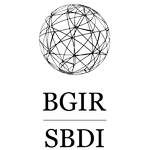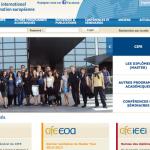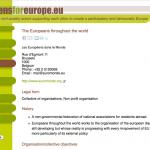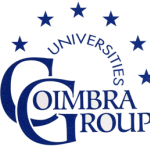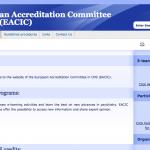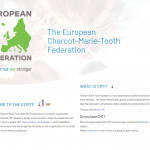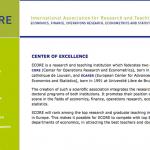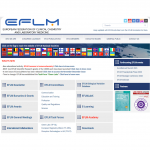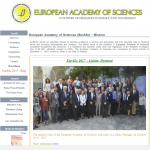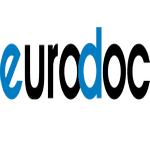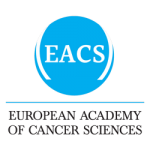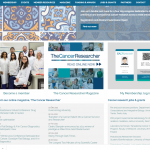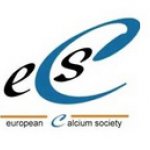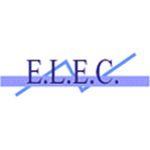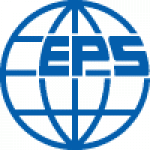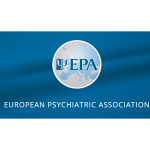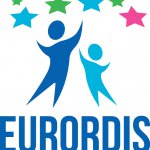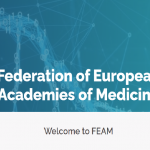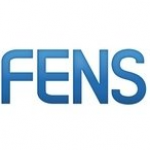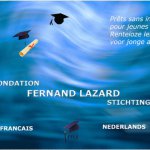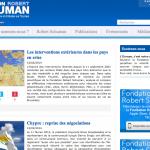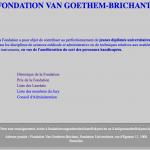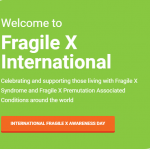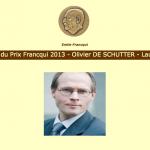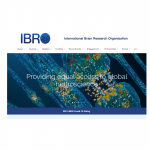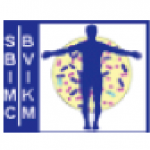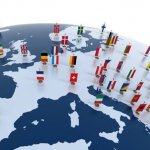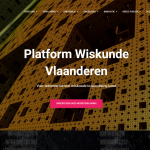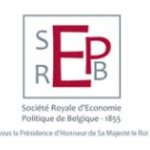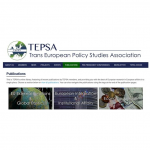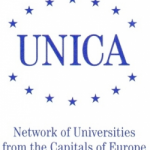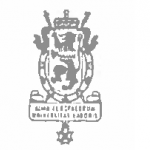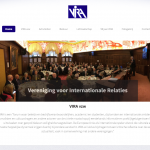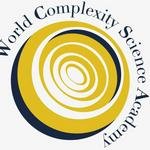In accordance with its mission to stimulate the communication between Belgian academics internally and also with academics from other countries, the University Foundation houses a number of national and international organisations with academic character. Below the list is given of the presently housed organizations; for more information click on the name. The link to their website is also provided (click on the picture).
Guest organizations that are not yet listed can submit their data to the University Foundation via this online form. Host organizations that are already listed but want to make changes to the listing, use this form.
acatech – The National Academy of Science and Engineering in Germany has a mandate from the Federal Government and the Länder to provide expert knowledge to policymakers. It offers effective structures for the science-based discussion of strategic technology issues. Experts from science, industry and civil society develop evidence-based proposals to support public and policy debate. acatech addresses, among others, topics such as AI, Climate and Environmental Protection, Data Spaces, Life and Health Sciences, Security, Strategic Sovereignty, and Sustainable Mobility. Additionally, acatech represents Germany’s technological sciences at the European umbrella organisation Euro-CASE and its global counterpart CAETS.
ALLEA is the European Federation of Academies of Sciences and Humanities, representing more than 50 academies from over 40 EU and non-EU countries. Since its foundation in 1994, ALLEA speaks out on behalf of its members on the European and international stages, promotes science as a global public good, and facilitates scientific collaboration across borders and disciplines.
Academies are self-governing bodies of distinguished scientists drawn from all fields of scholarly inquiry. They contain a unique human resource of intellectual excellence, experience and multidisciplinary knowledge dedicated to the advancement of science and scholarship in Europe and the world. More information.
The Belgian American Educational Foundation Inc. is the leading independent philanthropy in the support of exchanging university students, scientists and scholars between the United States and Belgium.
BCLAS ASBL/VZW is a scientific organization for the stimulation and development of the ethical care and use of laboratory animals.
The Belgian Brain Council serves as a platform representing brain researchers, patient advocates, clinicians and scientific societies at national level. Promoting brain research, reducing stigma and empowering those affected by mental or neurological conditions are core objectives of our advocacy work.
The Belgian Society of International Law was founded in April 1977 and is registered as an international, non-profit organization. According to its statutes, the Society aims to contribute, in a spirit of scientific objectivity, to the progress of international law, and to maintain permanent contact between all those who, in Belgium or abroad, are interested in this area. The Society currently has more than 70 members from Belgium and abroad. Our members are professors, scholars, Ph.D. researchers or practitioners who are based in Belgium or abroad, and who are active in the fields of public or private international law.
Les activités du CIFE comprennent l'étude, l'enseignement, la formation et la recherche sur les problèmes de l'unification européenne et mondiale, le fédéralisme, le régionalisme et les transformations des structures de la société contemporaine, selon une prospective fédéraliste. Le CIFE bénéficie du soutien de l'Union européenne, de plusieurs organisations internationales, de gouvernements nationaux, de collectivités locales, ainsi que de fondations privées et d'entreprises.
Promote international collaboration between the associations of nationals residing abroad and foster development of such associations.Advance the study and knowledge in the widest sense of the rights and duties of the Europeans abroad and to act towards all authorities as their spokesman and defender.Perform studies and joint activities in the spirit of the European Union, and disseminate information.Contribute to international life and bring together the people.
The Coimbra Group was founded in 1985 and formally constituted by Charter in 1987. It is an association of long-established European multidisciplinary universities of high international standard. The Coimbra Group is committed to creating special academic and cultural ties in order to promote, for the benefit of its members, internationalisation, academic collaboration, excellence in learning and research, and service to society. It is also the purpose of the Group to influence European educational policy and to develop best practice through mutual exchange of experience.
The Digital Institute for Cancer Outcome Research (DIGICORE) is a European Economic Interest Grouping established in Brussels on April 1st 2021.
Today, the Grouping sees the participation of 30 prominent cancer centres from 17 countries, and 2 national cancer networks. Two industrial partners take part to the network: IQVIA, the worldwide leading company of clinical research and Illumina, the global leader in DNA sequencing and bioinformatics.
DIGICORE is a pan-European research network built to accelerate the implementation of precision oncology in Europe. It promotes and equips cancer centres in their use of routine electronic health records (EHR) and molecular diagnostic information (MDX) for trial automation, real world outcomes research, digital diagnostics and care quality management.
The central purpose of the European Accreditation Committee in CNS (EACIC) is to promote and encourage the development of CME in CNS mainly neuropsychiatry and neuropsychopharmacology throughout Europe (both Western and Eastern Europe), to establish policies and high standards for CME, and to ensure that CME plays an important role in the process of helping health care workers to provide improved standards of clinical care to their patients.EACIC is mainly concerned with medical educational activities, which will be attended by health care workers from more than one European country. Or, in the case of enduring materials, read by, or used by, health care workers from more than one European country.
The European Brain Council (EBC) is a network of key players in the “Brain Area”, with a membership encompassing scientific societies, patient organisations, professional societies and industry partners. A non-profit organisation based in Brussels, its main mission is to promote brain research with the ultimate goal of improving the lives of the millions of Europeans living with brain conditions, mental and neurological alike. With the aim to speak with one voice, EBC stands as the platform to foster cooperation between its member organisations and other stakeholders, consistently promoting dialogue between scientists, industry and society.
The European Brain Data Hub (EBDH) is the first altruistic European association dedicated to mental health and brain data. EBDH facilitates the voluntary sharing of data to improve research, public policy, and healthcare.
It was established under the Data Governance Act to provide a secure European platform for data sharing aimed at advancing health, particularly mental and brain health.
The European CMT Federation (ECMTF) is a non-profit organization grouping European national associations supporting people affected by the Charcot-Marie-Tooth disease.
One of the Federation’s primary goals is to encourage research projects for an affordable and effective treatment for CMT. We promote communication and collaboration between CMT organizations/charities and provide help and advice for creating other CMT organizations where no such organization exists currently.
ECORE is a research and teaching institution which federates two centers of excellence: CORE (Center for Operations Research and Econometrics), born in 1966 at Université catholique de Louvain, and ECARES (European Center for Advanced Research in Economics and Statistics), born in 1991 at Université Libre de Bruxelles.
EFLM connects National Societies of Clinical Chemistry and Laboratory Medicine and creates a platform for all European “Specialists in Laboratory Medicine”. EFLM provides European leadership in Clinical Chemistry and Laboratory Medicine to national professional societies, the diagnostic industry and to governmental and non-governmental organisations in order to serve the public interest in health care.
The European Academy of Sciences (EURASC)'s objective is to promote scientific research in Europe. It tries to enhance fruitful collaborations between scientists, engineers, and public authorities ; to enhance links between fundamental and applied research, and between researchers and users ; and to stimulate public interest in science. Its present membership of around 500 members comprises most eminent scientists, mainly in Europe but also all over the world. The Academy has nine divisions (chemical sciences, computational sciences, earth and environmental sciences, engineering, materials science, mathematics, medicine and life sciences, physical sciences, social sciences and humanities).
Eurodoc, the European Council of Doctoral Candidates and Junior Researchers, is a grassroots federation of 24 national associations of early career researchers (ECRs) from 22 countries across Europe. Eurodoc was founded in Girona (Spain) on 02/02/02. Since 2005, Eurodoc has its seat in Brussels, Belgium. As a representative of doctoral candidates and junior researchers at the European level, Eurodoc engages with all major stakeholders in research, higher education, and innovation in Europe.
The European Academy of Cancer Sciences (EACS) is an independent advisory body of well‐recognised medical specialists and researchers striving to create a compelling interactive continuum of cancer research, from innovative basic research to implementation and evaluation of state‐of‐the‐art evidence‐based cancer care and prevention
The EACR is a global community of cancer researchers with more than 10,000 members in 100+ countries. We facilitate communication and collaboration within the cancer research community, provide a wide variety of services and funding to our community of members, and organise scientific conferences of the highest quality.
The European Calcium Society (ECS) exists since 1997 as an international non-profit association. It forms in the world the largest gathering of scientists working in the calcium field with 250+ members from over 30 countries (including many non-European countries). The aim of the ECS is to develop and sustain relationships between all scientists working in the calcium field with special attention for the needs and the participation of the junior researchers in the field (e.g. via travel fellowships, discounted membership and registration fees, poster prizes, and since 2019 an own junior ECS Board) and with maximal respect for gender equality. It organizes to this aim amongst other initiatives highly successful International Meetings and workshops.
The European League for Economic Cooperation (ELEC) is a network of European entrepreneurs of goodwill, aimed at putting timely intellectual pressure on European decision makers to further economic integration in Europe. It acts in complete independence from national or private interests, public authorities or any pressure group.
ENEN is an international non-profit association. The main purpose of the ENEN is the preservation and the further development of expertise in the nuclear fields by higher education and training in Europe.
The European Physical Society (EPS) is a non-profit organisation created in 1968 whose purpose is to promote physics in Europe. Today the EPS represents 42 National Physical Societies with 130,000 researchers including Nobel Prize Laureates and renown physicists who advocate for physics research and its contribution to the economic, technological, social and cultural development in Europe and neighbouring countries. The organisation contributes to the advancement of physics, in particular through the promotion and the inclusion of young physicists and it acts as a forum for discussion of scientific and policy related subjects, and, as such provides the appropriate means to take action at European level. Furthermore, the EPS promotes and advocates excellence in research and cooperation with physics-based industries, education and student mobility, publication and outreach.
Improving Psychiatry and Mental Health Care in Europe
With active individual members in as many as 88 countries and 44 National Psychiatric Association Members who represent more than 80,000 European psychiatrists, the European Psychiatric Association is the main association representing psychiatry in Europe.
The EPA’s activities address the interests of psychiatrists in academia, research and practice throughout all stages of career development. The EPA deals with psychiatry and its related disciplines and focuses on the improvement of care for the mentally ill as well as on the development of professional excellence.
EURORDIS-Rare Diseases Europe is a unique, non-profit alliance of over 900 rare disease patient organisations from more than 70 countries that work together to improve the lives of the 30 million people living with a rare disease in Europe.
By connecting patients, families and patient groups, as well as by bringing together all stakeholders and mobilising the rare disease community, EURORDIS strengthens the patient voice and shapes research, policies and patient services.
FABI (Royal Federation of Belgian Associations of Engineers) brings together civil engineers from the Universities of Brussels, Mons and Liège, the Montefiore Institute in Liège and the Royal Military School, as well as bioengineers from the Universities of Brussels and Liège (Gembloux Agro-Bio Tech).
Founded in 1926, the Federation acts as the spokesman of engineers to the country's French-speaking academic, economic and political institutions, highlighting the commitment and contribution of its members to technological and societal advances.
Its main mission is to promote, enhance and make attractive the engineering professions, to collect and relay information essential to engineers and to encourage exchanges between school associations and between all engineers.
FEAM is a European platform of 23 national Academies of Medicine, Pharmacy and Veterinary Science, or national Academies via their medical division, representing over 4,000 among the best biomedical scientists across Europe. Its mission is to provide independent scientific advice to EU and national policymakers on matters of health and biomedical science.
Founded in 1998 at the first Forum of European Neuroscience, the Federation of European Neuroscience Societies (FENS) is the main organisation for neuroscience in Europe. FENS currently represents 44 European national and single discipline neuroscience societies with more than 20,000 member scientists from 33 European countries. FENS promotes neuroscience research to policy-makers, funding bodies and the general public, both regionally and internationally. Hence, FENS promotes excellence in neuroscience research and facilitates the exchange and networking between neuroscientists within the European Research Area and beyond.
De Stichting Fernand Lazard verstrekt renteloze leningen (tot 25.000 EUR) aan jonge academici om ze in het begin van hun beroepsleven te helpen hun installatiekosten of specialisatiejaar in het buitenland te financieren.
De Raad van Bestuur kan daarenboven uitzonderlijk kandidaten selecteren en hen een beurs toekennen.
Deadline : Jaarlijks 5 februari
The Robert Schuman Foundation that was founded in 1991 after the fall of the Berlin Wall has been approved by the State for its services to the public; it works to promote the construction of Europe. The Foundation which is a reference research centre develops studies on the European Union and its policies promoting the content of these in France, Europe and elsewhere in the world. It encourages, contributes to and stimulates European debate thanks to the wealth of its research, publications and the organisation of conferences.
La Fondation a pour objet de contribuer au perfectionnement de jeunes diplômés universitaires, dans les disciplines de sciences médicale et administrative ou de techniques relatives aux matières et instruments, en vue de l'amélioration du sort des personnes handicapées.
Fragile X International - FraXI - is an International Non-Profit Organization (INPO), founded by a network of 17 country family organisations, with a growing membership. FraXI is a conduit for countries to work together and an official entity for sharing of international knowledge and expertise on Fragile X Syndrome and Fragile X Premutation Associated Conditions, a rare disease but the first genetic hereditary cause of intellectual disability. FraXI aims to drive research, encourage international collaborations and contribute with a unified voice of lived experience from its international network.
The purpose of the Francqui Foundation is to encourage the prestige of disinterested fundamental research. It also provides Belgian scholars and scientists with indisputable moral support. The statutes clearly state that its objective is "to further the development of higher education and scientific research in Belgium". This implicitly means that interuniversity collaboration is also encouraged.
The International Nuclear Law Association (INLA) was established in the early 1970's in order to strengthen relations among specialists of this branch of law. Its Statutes provide that this non-profit making private association will pursue on an international level the study of legal issues related to the peaceful uses of nuclear energy, the exchange of information between its members, and scientific cooperation.
IBRO is the global association of neuroscience societies established in 1961 that aims to promote and support neuroscience around the world through training, education, research, outreach and engagement activities, and the publication of our two journals, Neuroscience and IBRO Neuroscience Reports. More than 90 international, regional and national scientific members constitute IBRO’s Governing Council which, together with the IBRO Executive Committee and five Regional Committees, address the needs and advance the work of individual scientists and research communities everywhere. In addition, IBRO has partnerships with like-minded scientific organizations to identify priorities and help bridge gaps in knowledge, investment and resources in the field of brain research.
La Société Belge d''Infectiologie et de Microbiologie Clinique (SBIMC) a été fondée en 1991, mais trouve ses racines dans un nombre de rencontres formelles et informelles entre les microbiologistes et cliniciens belges et d'autres professionnels de la santé qui ont un intérêt particulier et sont actifs dans le monde de l'infectiologie et du traitement anti-infectieux.
Les buts de l'association sont décrites dans ce document.
LifeMe asbl (LifeStyle as Medicine) aims to substantiate and promote the concept of lifestyle as medicine and lifestyle medicine. LifeMe works according to the principles of evidence-based medicine and best practice. LifeMe is based on seven pilars: nutrition, exercise, coping with stress, social support, sleep, environment and meaning.
Starting from these principles, we also focus on promising innovative techniques and insights to promote health and wellbeing, especially of people with increased health risk and/or chronic conditions.
The Organisation of European Cancer Institutes “OECI” was founded in Vienna in 1979 and remodelled in 2005 into OECI-EEIG, a European Economic Interest Grouping. Today, the OECI regroups 102 Members, which include some of the most prominent European Comprehensive Cancer Centres.
The OECI aim is to accelerate the application of multidisciplinary personalised care approaches, to reduce morbidity and to guarantee an equitable access to care to all cancer patients and supporting parallel initiatives outside the EU and in other continents.
This goal is being achieved by promoting and enhancing the concept of “comprehensiveness” and “multi-disciplinarity”, supporting quality in cancer care and dynamically working in crosscut expertise by involving the OECI Working Groups, the Members and promoting synergies with other cancer Organisations.
Platform Wiskunde Vlaanderen vzw aims at: strengthening, organizing and streamlining mathematics in Flanders, as an important knowledge area in the Flemish knowledge society, in particular in the areas of public awareness, education, research and innovation. This is done by bringing together in a coordinated way the different actors within the Flemish, mathematical community; developing shared visions and supported positions with all sections of the Flemish mathematical community; and providing information, sensitization and campaigns to improve the image of mathematics. In addition, Platform Wiskunde Vlaanderen is a point of contact for everything related to mathematics in Flanders: for governments, educational actors, industry, citizens and media.
SEII made it its mission to foster the essential role that engineers play in the sustainable development of a « knowledge society ». With that aim in mind, SEII, as a learned society, will contribute to the dissemination of knowledge and to its interdisciplinary fertilization, both on national and European level, through organizing various events such as lectures, conferences and colloquia, through taking part in similar events organized by other institutions, and through publishing relevant articles and information.
SEII will also, within its means and in cooperation with academia, foster continuing engineering education.
The Koninklijke Vereniging voor Politieke Economie van België / Société Royale d’Economie Politique de Belgique aims to contribute to the influence and progress of economic science. Founded in 1855 and placed under the honorary presidency of His Majesty the King, it is one of the oldest economic associations. It organizes conferences and disseminates information on various activities and publications of interest to Belgian economists.
The Trans European Policy Studies Association (TEPSA) is the first transeuropean research network. It consists of leading research institutes in the field of European affairs throughout Europe, with an office in Brussels. TEPSA’s aim is to provide a high quality research on European integration based on a triple “A” approach: Analysis, Assessment and Advice in order to stimulate discussion on policies and political options for Europe. The network was established in 1974 and it has steadily increased its membership ever since to include institutes all throughout Europe in response to the enlargement rounds of the European Union. Nowadays TEPSA consists of 43 member institutes and associate members located in 36 countries, both EU member states and other European countries. TEPSA and its member institutes provide expertise on EU policies and politics have vast experience in organising and conducting EU wide research, training and networks.
Our three values are : Transparency, Integrity and Accountability.
Our goals are to protect public resources, stop the flow of dirty money, ensure integrity in politics, promote integrity in business, pursue law enforcement and justice, expand the civic space for accountability, and develop the spirit of initiative within the community against corruption.
We hold the powerful and the corrupt to account by exposing the systems and networks that foster corruption. We advocate policies and build coalitions to change the status quo.
Our vision of a world free of corruption is not an end in itself. It is a struggle for social and economic justice, human rights, peace and security.
Our fight against corruption rests on three pillars: education, research and advocacy. These pillars aim to prevent the negative impact of corruption on Belgian society.
UNICA is an institutional Network of Universities from the Capitals of Europe. It was founded in 1990, and it is currently made up of 54 universities from 41 capital cities of Europe, combining over 150.000 university staff and 1.500,000 students. UNICA aims at building on the specific profile of its Members to widen and strengthen international collaborations, engage academic leadership, and facilitate networking among academic communities through understanding and sharing between its Members throughout the European Higher Education and Research Areas. Its vision is to be a driving force in the development of the European Higher Education and Research Areas and empower its Member Universities to unlock their full potential, putting knowledge, research, and innovation at the service of the needs of our societies and of the coming generations.
The European University of Labor (foundation, establishment of public utility) has as its object, excluding any profit-making purpose or ideological or political concern, to promote education, training and socio-cultural and technical – scientific promotion.
The UET supports teaching and research on the principle of the free development of the individual and his personal fulfillment through his creative faculties; only freedom of conscience, intellectual objectivity and the values of experimental knowledge guide its initiatives and actions.
Founded in Brussels in 1963, VIRA provides a forum in which public and private managers, academics and students, diplomats and international officials, journalists and cultural agents can exchange information and points of view about international developments. Special attention is paid to geopolitical and European subjects catching the public eye and showing societal relevance. As the capital of Belgium and of Europe and seat of numerous international institutions, Brussels is endowed with obvious assets for bringing together eminent personalities in such a forum. About ten times a year, lunch or evening conferences or panel-debates are held with high-level speakers, mainly in Dutch but occasionally also in French and English. Those activities may take place in cooperation with other associations.
World Complexity Science Academy (WCSA) is a research based policy focused think tank whose motto is “research determines policy, policy determines politics”. WCSA core is the understanding and analysis of geopolitical scenarios and the development of a highly viable toolkit for complex organizational and institutional design. Cosmopollitan complexity management , citizenship policies, cosntructivist design for complex organizations, global governance strategies , policy modelling, complex models of sustainability policies are some of the key areas in which WCSA is committed.

